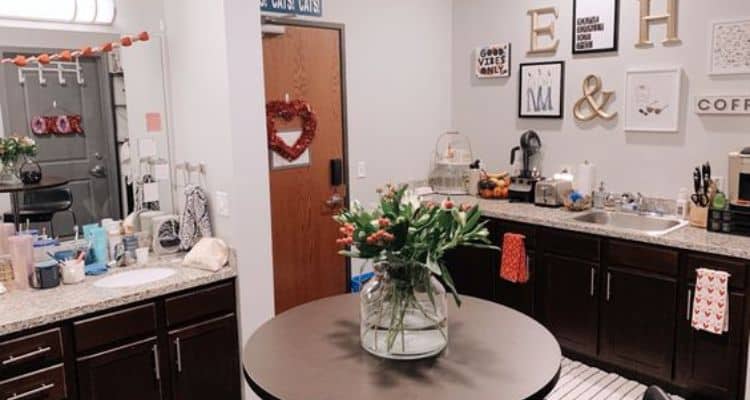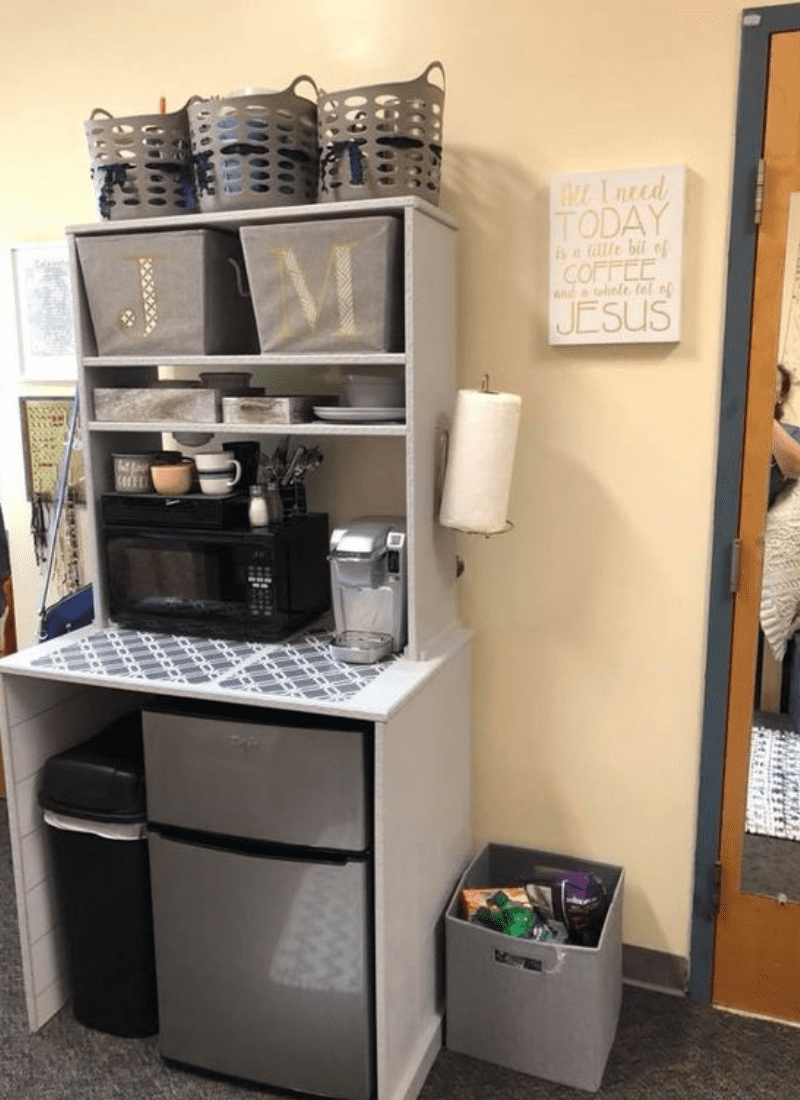Are you curious about whether college dorms typically come equipped with kitchens? In this post, we’ll explore the common features of college dorms and what you can expect in terms of kitchen facilities!

College dormitories are essential to campus life, providing students with a space to live and study during their college years. One of the most significant factors in determining the quality of life in dormitories is the availability of kitchens. With students’ hectic schedules and the need to maintain a balanced diet, access to kitchens is essential to campus life. Do all college dorms have kitchens?
Not all college dorms have kitchens. The availability of kitchens varies from campus to campus, and some schools may only offer communal kitchens or kitchenettes in certain housing options.
While many universities provide fully furnished dormitories, the facilities available vary from campus to campus. Some schools may offer communal kitchens, while others provide kitchenettes in each dorm room. The availability of kitchens may also depend on the type of housing students choose, such as traditional dorms, apartments, or suites. This article will explore whether all college dorms have kitchens and the factors determining their availability.
The Importance of Kitchen Facilities in College Dormitories
Eating a healthy and balanced diet is crucial for students’ health and academic performance. Kitchen facilities in college dormitories are an important aspect of student life. Having access to a kitchen enables students to prepare their meals and have control over the ingredients they use, allowing them to tailor their diets to meet their nutritional needs.
Cooking at home can also be less expensive than dining out or purchasing pre-made meals, making it an affordable option for students on a tight budget.
Additionally, kitchens in dormitories can be a communal spaces where students come together to cook and socialize. This can foster a sense of community on campus and allow students to meet new people and make friends. Cooking and eating together can be a bonding experience, and students can learn from each other’s cultural backgrounds and food traditions.
Overall, having access to kitchen facilities in college dormitories provides students with the resources they need to maintain a healthy and affordable lifestyle while also building a sense of community on campus.
Related posts you may like: Dorm Room Desk Essentials You Will Actually Use
Types of College Dormitories and Their Kitchen Facilities
College dormitories come in different types, and the availability of kitchen facilities varies depending on the type of housing. Here are the common types of college dormitories and their kitchen facilities:
- Traditional Dormitories: These are the most common college dormitories, and they usually have communal kitchens on each floor or wing. These kitchens are equipped with basic appliances, such as a stove, oven, and refrigerator, and students can use them to prepare meals.
- Apartment-Style Dormitories: These dormitories typically have a shared kitchen in the common area. The kitchen is fully equipped with appliances, such as a stove, oven, refrigerator, and dishwasher, and students can use them for cooking and cleaning up after themselves.
- Suite-Style Dormitories: These dormitories have a shared kitchenette in each suite equipped with a mini-fridge, microwave, and sink. Students can use these facilities to prepare snacks and light meals.
- Off-Campus Housing: Students who live off-campus may have access to a full kitchen in their apartment or house. This gives students more flexibility in cooking and meal planning, but they are responsible for purchasing their groceries and cooking supplies.
In summary, the availability of kitchen facilities varies depending on the type of college dormitory. Traditional dormitories usually have communal kitchens on each floor, while apartment-style and suite-style dormitories have shared kitchens. Off-campus housing provides students access to a full kitchen, but they are responsible for purchasing groceries and cooking supplies.
Schools That Offer Kitchenettes in Dorm Rooms
While not all college dormitories have full kitchens, some schools offer kitchenettes in dorm rooms. Here are some examples of schools that provide kitchenettes in their dorm rooms:
- Purdue University: The university’s residence halls offer a micro-fridge and a microwave in each room. Some residence halls also have a community kitchen for students to use.
- University of California, Berkeley: The school’s apartment-style dormitories have a full kitchen in each unit, including a stove, oven, refrigerator, and dishwasher.
- University of North Carolina at Chapel Hill: Some of the university’s residence halls have suite-style rooms with a kitchenette with a sink, mini-fridge, and microwave.
- Loyola University Chicago: The university’s suite-style residence halls have a small kitchenette with a mini-fridge, microwave, and sink.
- Georgetown University: The school’s townhouses offer a full kitchen in each unit, including a stove, oven, refrigerator, and dishwasher.
A kitchenette in the dorm room can be convenient for students who want to prepare their meals without leaving. This option allows students more control over their diet and saves time by not having to travel to a communal kitchen.
Related posts you may like: Best 15 Dorm Room Lighting Ideas to Make Your Place Comfy
Communal Kitchens in College Dormitories
Communal kitchens are common in college dormitories, particularly in traditional dormitories. Communal kitchens are typically located on each floor or wing of a dormitory; all students share them on that floor or wing. These shared kitchen spaces allow students to prepare meals and socialize with their peers.
They are equipped with basic appliances, such as a stove, oven, and refrigerator, and some kitchens may also have a microwave and dishwasher. However, rules and regulations regarding the use of communal kitchens can vary by school. Some schools may require students to sign up for time slots to use the kitchen, while others may prohibit certain appliances, such as hot plates or toasters.
Additionally, schools may have cleaning schedules or require students to clean up after themselves to maintain the cleanliness of the kitchen.
Communal kitchens also provide a social space for students to meet and bond over food. Cooking and eating together can be a great way to build relationships and learn about different cultures and food traditions. Communal kitchens can also help students struggling with homesickness by providing a sense of community and family away from home.
However, it is important for students to be mindful of other residents’ needs and be considerate of their space and belongings. Overall, communal kitchens are an essential feature of college dormitories that provide students with the resources to prepare meals and build connections with their peers.
Alternative Housing Options with Kitchens on Campus
While traditional dormitories are the most common form of on-campus housing, other housing options offer more extensive kitchen facilities. Here are some examples of alternative housing options with kitchens on campus:
- Apartment-Style Dormitories: These dormitories typically have a shared kitchen in the common area. The kitchen is fully equipped with appliances, such as a stove, oven, refrigerator, and dishwasher, and students can use them to cook and clean up after themselves.
- Suite-Style Dormitories: These dormitories have a shared kitchenette in each suite equipped with a mini-fridge, microwave, and sink. Students can use these facilities to prepare snacks and light meals.
- Residential Colleges: Some universities have residential colleges and smaller living communities within the larger campus. These residential colleges often have fully equipped kitchens for students to use.
- Co-op Housing: Co-op housing is a student-run living community where students share the responsibility of cooking and cleaning. Co-op houses typically have a full kitchen that all residents use.
Having access to more extensive kitchen facilities can benefit students who enjoy cooking and want more control over their meals. Alternative housing options with kitchens on campus give students greater independence and flexibility in their meal planning.
Related posts you may like: 10 Ways to Organize Your Food in a Dorm Room Mini Fridge
Off-Campus Living: Kitchens in Apartments and Houses
Off-campus living provides students with even more flexibility in terms of kitchen facilities. Many students choose to live in apartments or houses off-campus, which typically have full kitchens. These kitchens are equipped with appliances, such as a stove, oven, refrigerator, dishwasher, and microwave, and students can use them to prepare their meals. Living off-campus also provides students with the freedom to purchase their groceries and cooking supplies, allowing them to have more control over their diets and save money.
Many students enjoy the independence and flexibility of living off-campus and access to a full kitchen. However, living off-campus requires students to take responsibility for purchasing and preparing meals and cleaning up after themselves. They must also be mindful of their neighbors and follow the rules and regulations of their apartment or house.
Off-campus living provides students with more extensive kitchen facilities and the freedom to prepare meals according to their needs and preferences. While it requires more responsibility, living off-campus can be a great option for students who enjoy cooking and want more control over their diets.
Tips for Making the Most of Kitchen Facilities in College Dormitories
Making the most of kitchen facilities in college dormitories can be challenging, especially if you share the kitchen with other students. Here are some tips to help you make the most of your dormitory kitchen:
- Plan Ahead: Plan your meals, and make a grocery list before you go to the store. This will help you save time and ensure that you have all the ingredients you need to prepare your meals.
- Be Mindful of Others: Be considerate of other students using the kitchen. Clean up, and don’t leave dirty dishes in the sink.
- Use Appliances Safely: Follow the rules and regulations regarding the use of appliances in the kitchen. Don’t leave appliances unattended, and never overload electrical outlets.
- Meal Prep: Consider meal prepping to save time and maximize your kitchen facilities. Prepare meals in advance and store them in the refrigerator or freezer for later use.
- Collaborate with Roommates: Work with your roommates to coordinate the kitchen use. Share ingredients and cooking responsibilities to make the most of your kitchen space.
- Get Creative: Don’t be afraid to get creative with your meals. Use spices and herbs to flavor your dishes, and try new recipes to keep things interesting.
By following these tips, you can make the most of your kitchen facilities in college dormitories and prepare healthy and delicious meals while building relationships with your peers.
Related posts you may like:




